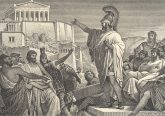
Bakir Izetbegovic, former president of Bosnia and Herzegovina, had two main messages in a recent lecture at the Oxford Centre for Islamic Studies: “Islam is not alien to the spirit of Europe” and “We [Bosniaks] are the moral victors of the wars”, the latter referring to the conflict in the early 1990s. He reminded the audience that European culture, history and civilization is not only Judeo-Christian in spirit but also Muslim. “Muslims were the co-creators and thus co-owners of European culture and civilization…Muslims made a colossal contribution to the world culture and civilization”.
Bakir Izetbegovic, the former leader of one of the three main political parties in Bosnia and Herzegovina, portrayed the history of Bosnian Muslims as a struggle for recognition and equality under a multitude of oppressors. Starting with a history of medieval Bosnia and the Bosnian Church, Izetbegovic discussed each period of Bosnian history. Across historical time, Bosnia, to him, stood for a meeting place of ideas, times of conflict notwithstanding.
Years of Muslim rule proved far better than what followed. Bosnia, in his opinion, flourished under the Ottomans, but suffered under the rule of Christian Austria-Hungary. Still, he acknowledged the modernization contribution of the Austrian rulers and the lasting privileges’ Bosniaks have enjoyed since the late 19th century, thanks to links with Austria.
His portrayal of the Bosniak experiences in the 20th century was significantly bleaker. They were “marginalized, assimilated and threatened” by the socialist regime of Josip Broz Tito. He thought that the latest war in Bosnia was a “genocidal attack” by Croatia and Serbia and an effort of colonization aimed at splitting the country apart. “We are the moral victors of the war. … There is no military victory in this war”, he insisted. A “victory of good over evil” was his briefest assessment of the Bosnian war.
A more complete story, please
Izetbegovic’s narrative was clearly influenced by the legacy of his late father Alija Izetbegovic, the former leader of the Bosniaks during the 1990s war. Bakir Izetbegovic cited from his father’s well-known Islamic Declaration (for which he was imprisoned during Tito’s socialist regime, accused of Islamic radicalism and public support for nationalist ideology), which was banned in socialist Yugoslavia. Alija Izetbegovic was also the main supporter for the national term “Bosniak”, which to him existed as a regional term for the population in the Bosnian territory, starting back in medieval times.
But as the former leader of the strongest political party representing Bosnian Muslims, SDA (Party of Democratic Action), Bakir Izetbegovic spoke in the name of only one section of the Bosnian population, to which he exclusively referred to as Bosniaks, much like his late father did. As if no other people suffered during the course of turbulent history in the Balkans, Izetbegovic discussed crimes committed only on Bosniaks — leaving Croats, Serbs as well as other ethno-national and religious groups aside. His sheer lack of acknowledgment for other groups living in Bosnia (he mentioned them only in passing) was striking. Elaborating on the extensive killing of Bosnian Muslims during the Second World War, he did not remember the great numbers of Serbs slaughtered in concentration camps, nor the number of Muslims who joined Croat forces and participated in atrocities. Neither did he mention the Croats and Serbs cleansed and killed during the latest wars. Black and white, evil vs. good, this history lesson was far too simple. Even more alarming was Izetbegovic’s assessment of the reconciliation progress in the country as good and positive. It is difficult to imagine any expert on the country sharing his opinion that regional cooperation is in a healthy shape and reconciliation heading the right way.
Although Bakir Izetbegovic’s correct and justified reminder that Islam is not foreign to Europe and should be accepted as part and parcel of our European civilization, culture and history, his eulogy on the Bosniak people and the one-sided assessment of their history was a mockery to many in the audience. There is no dispute about the historical facts, numbers of murdered Bosnian Muslims and their great suffering during the last century and especially in the latest wars. They suffered and they were victims of many heinous crimes. Yet they were not the only ones and the time might be ripe to admit that. However, as a representative of a political party from a divided country (though he disagrees with this assessment too), he certainly did not come to Oxford with any surprises.
A version of this article appeared on my personal blog.







1 Comment
this man is full of it. lie after lie…he still claims that “200,000 muslims” were killed in the 90s…